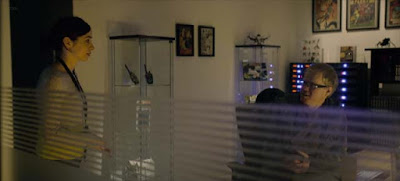Black Mirror (2011-)
Season 4 - 6 episodes (2017)
Watch Black Mirror Season 4 on Netflix
Created by: Charlie Brooker
Starring: Jesse Plemons, Cristin Milioti, Jimmi Simpson
Watch the trailer
Black Mirror Main Page
Plot
Each
unconnected episode examines the pitfalls when technology and society
intersect. What happens when technology goes off the rails, creating a
horrifying situation? Does technology make
us happier, is being connected at all times beneficial, and does it do more
harm than good? The stories are known for their harrowing nature and depressing conclusions.
The first episode of season four is USS Callister, where a maligned and ignored programmer lives out his fantasies in a virtual reality world.
Verdict
It starts with an eye roll inducing scene before deftly revealing what's really happening. It's a big caution to virtual reality and how that can cause people to act out dark fantasies. This takes a turn when Daly takes a coffee cup from Nanette. We don't know what the sample is "assimilating" but when we do,
oh boy.
This has all the depth I've come to expect from Black Mirror,
but it treads too closely to what we've seen before. It raises many questions as the show always does.
Daly gets worse with each passing scene. He's tormenting people, it's just that they aren't physical. Even in the first scene he blows up a ship
which has a larger implication when you think about it after the episode. This makes you feel for the guy, before it
turns the tables. He isn't a good person. We realize it's good he doesn't
act on his feelings as we slowly we travel down the wormhole of who this guy is or what he's become. Welcome to VR.
Watch it.
Review
I wasn't sure what this was after the first scene. It seemed like a Star Trek spoof. That's exactly what it is. We're watching a man fulfill his dreams in a virtual reality world. He's pretending to live out his favorite television show using his co-workers as subordinates while casting himself as the dashing hero. The episode is especially timely, with the Captain kissing both women of the crew after completing the mission. This seemed poised to be a Galaxy Quest type parody focusing on sexism.
Jesse Plemons plays Robert Daly. He's maligned and ignored despite being the co-founder of the company. He's perpetually on the outside looking in. I wondered if this was self administered therapy, with the possibility of Robert's alter ego bleeding into the real world. He calls a co-worker by their USS Callister name before quickly correcting himself. Would this VR world help him overcome his social anxiety yet have some disastrous consequence? Would the VR wish fulfillment cause his real life to stagnate since he can easily be the hero with less effort in VR? Maybe this episode would resolve with Daly deciding to live in VR instead of the real world.Black Mirror provides so many tangents to consider.
Then Daly takes DNA from the cup of a new employee, Nanette, after hours. Nanette appreciated Daly's code and seemed to like him, before co-workers warned her away. Is this DNA for the game? Yes. The story then continues from Nanette's point of view. How, does the game run autonomously? It does. Daly is using DNA to re-create digital counterparts of co-workers. I wondered why they didn't revolt. Is he controlling them through programming? How do they know so much, has Daly told them about the world? I love that Black Mirror always does a good job of answering my questions. Small details are not just hand waved away. I wondered how the crew knew so much about this world and we get that answer. We also learn just how twisted Daly is.
Black Mirror has mined this theme before in White Christmas, a digital avatar that thinks its real is trapped in a digital prison.
Daly has created a VR bully simulator with himself at the helm. He's all powerful With each scene set on the USS Callister he becomes more of a psychopath. It's a weird power trip, but it's strange that it doesn't make him more assertive in the real world. Why doesn't he act out there? While it cut's both ways, this world is a response to how he was treated in life, he's clearly a psychopath. His life experience doesn't justify this VR world, but it makes you think twice about how you treat people, sometimes without realizing it. Did VR stop him from harming people in the real world?
Nanette is overwhelmed in this new world and there's a certain amount of humor having someone question some of the basic tenants of Star Trek. This also raises some questions about what the Star Trek crew are doing when we aren't seeing their adventures. It's a bizarro and frightening behind the scenes look of a consciousness in prison.
The upside to this VR world is that without it Daly may have become vicious in real life. Is it just as bad to torment a digital consciousness? It's certainly serving the same effect without consequence.
The ending perfectly captures the online gaming interaction stereotype. I figured the gamer had to be Aaron Paul, and it is. The digital crew is now free of Daly's prison. The last shot of Daly shows him in a chair, never to wake up as a modified version of Silent Night plays, wow.
Wednesday, January 3, 2018
Subscribe to:
Post Comments
(
Atom
)










No comments :
Post a Comment